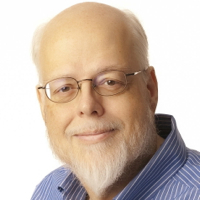I happened upon the perfect merger of Twitter and journalism on Monday, in a tweet from the Green Bay Press-Gazette, a newspaper where I worked in the first half of the 1980s.
It read: "Man buys small sailboat. Puts it in Fox River. Hits bridge. Goes over dam. Sailboat sinks."
There was a link, but it wasn't necessary unless you really needed to know the guy's name. Written as it was, it was clear there was no fatality (if you click on the link, you'll confirm that).
The staccato style made me laugh, while telling me everything I really needed to know about the story. The necessary "he saids" and formal language of conventional journalism are mostly read over anyway.
After retweeting it which also posts it on my Facebook page, I got a response from an old friend and Press-Gazette co-worker, Jeff Ash, who posted the tweet. Jeff told he was "just trying something different."
While Jeff's original tweet made me smile, it also made me think.
Just last week, I wrote a column about a contract dispute between Time Warner Cable and Disney over carrying the ESPN channels. I posted a link to the column on Twitter and Facebook as is my daily ritual.
A friend posted a comment to my link, writing, "I heard something about Time Warner and ESPN having a battle now too? Any truth to it?"
Well, the link only mentioned Disney and Time Warner. Disney owns ESPN. If he'd simply clicked on the link, he would have had his question answered.
But many people don't click on the link before posting a comment or reaction. That's not a problem when a guy buys a boat and hits a bridge. But when we're talking about big issues -- which do pop up regularly on Twitter -- 140 characters isn't enough to open the discussion.
There's nothing wrong with tiny bursts of information. This column is usually full of them.
I spent six months at USA Today back in the mid-1980s, working on the page with news from each of the 50 states. We were, in a sense, tweeting the news, dropping articles like "the" and substituting commas for the word "and." I don't need those tricks, since space isn't an issue on the Internet, but short bits provide a lot of value for little effort by the reader.
As I've said, there are a lot of boilerplate bits of journalese, like "so and so couldn't be reached for comment," a cover your butt phrase designed to show that you made the call. Even if you cut away all that journalism baloney, you don't cut the meat of a news story.
But reducing complex ideas to 140 characters -- as has become a trend thanks to Twitter's success -- is a dangerous oversimplification of a world that is increasingly complex.
On the air: Weathercaster Lyra O'Brien -- who has continued to do some freelance work for Channel 12 despite leaving the ABC station -- has been hired as a public relations account executive by Pewaukee-based advertising/branding firm, Z2.
- Phil Cianciola is taking his podcast on the road, setting up Thursday around noon on the first day of the Wisconsin State Fair at Rupena's. If you're a regular Philcast listener or miss him from his WTMJ-AM (620) days, he should be there throughout the afternoon.
- The Parents Television Council is lobbying advertisers not to buy time on CBS' new William Shatner sitcom, "$#*! My Dad Says." After watching the pilot, I can't imagine any advertisers investing in this clunker.
- Fox says no deals have been signed for new "American Idol" judges, although speculation continues to focus on Steven Tyler and Jennifer Lopez.
Oprah's final season: Ratings have been down for Oprah Winfrey's summer reruns. One reason could be that people think the show is ending this September. Nope, that's next September.
A new season, Oprah's 25th, kicks off Sept. 13. Here's the first promo for the final season:
Tim Cuprisin is the media columnist for OnMilwaukee.com. He's been a journalist for 30 years, starting in 1979 as a police reporter at the old City News Bureau of Chicago, a legendary wire service that's the reputed source of the journalistic maxim "if your mother says she loves you, check it out." He spent a couple years in the mean streets of his native Chicago, and then moved on to the Green Bay Press-Gazette and USA Today, before coming to the Milwaukee Journal in 1986.
A general assignment reporter, Cuprisin traveled Eastern Europe on several projects, starting with a look at Poland after five years of martial law, and a tour of six countries in the region after the Berlin Wall opened and Communism fell. He spent six weeks traversing the lands of the former Yugoslavia in 1994, linking Milwaukee Serbs, Croats and Bosnians with their war-torn homeland.
In the fall of 1994, a lifetime of serious television viewing earned him a daily column in the Milwaukee Journal (and, later the Journal Sentinel) focusing on TV and radio. For 15 years, he has chronicled the changes rocking broadcasting, both nationally and in Milwaukee, an effort he continues at OnMilwaukee.com.
When he's not watching TV, Cuprisin enjoys tending to his vegetable garden in the backyard of his home in Whitefish Bay, cooking and traveling.







